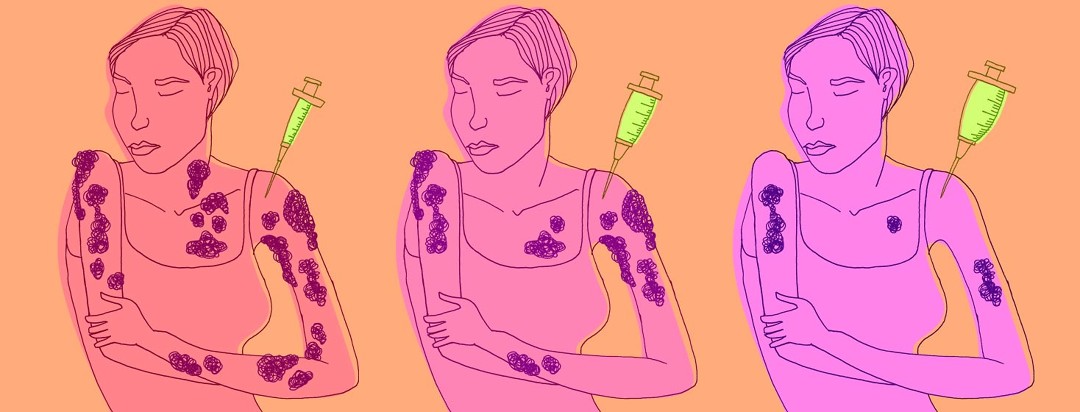My Non-Psoriasis Specialist Upped My Biologic Dosing and It Worked
I’ve noticed a trend in social media posts, groups, and boards where patients on biologics were talking about switching their treatments more frequently.
Basically, they were hopping from one treatment to the next. I began to wonder what the motivation was — not having the instant gratification of skin clearance or was it more? And I also wondered if they ever had time for the medication to start working. Apparently, I’m not alone in wondering this, as this question was brought up in a Twitter chat by a doctor who leads weekly chats.
Psoriasis 101: A trip to the doctor
When I was at my dermatologist’s office two weeks ago for an unrelated to psoriasis skin issue (aren’t they all related in the end?) - she did a double-take at my dosage. I’m on a stronger and more frequent dosage of a biologic injection because it’s treating my psoriasis, psoriatic arthritis, and Crohn’s disease. The dosage for my sole psoriasis is usually lower and starts at 8-week intervals.
My scalp had scales at the base of my skull where it’s lived rent-free since my teen years. They usually die down after injection and creep back up the week before my next. It’s painful, annoying, and worrisome. Every so often, my inverse psoriasis will creep back up - also around my injection time.
The results are in
Last year, my IBD specialist ran a panel to see how much medication was left in my body. She had blood drawn on the day I was due to inject. After the appointment, I went home and completed my injection and went on with life.
When the results came back, I was not surprised that I was a couple of points lower on my medication reserve than the year prior. I asked about upping frequency of dosing, and she said not yet.
Finally, an increase in medication
About six months later, I met with a new IBD specialist. While she treats IBD, psoriasis and psoriatic arthritis also fall under her jurisdiction. She looked at my joints, my skin, and my labs. This made me feel better as I had canceled my dermatology appointment a month prior and was feeling mega guilt. She asked for the paperwork for the biologic serum test and reviewed it and said, “Hmmm, this could be higher.”
My eyes grew wide, and jaw fell down. “I thought I was good?” I squeaked out. Having this biologic fail is a huge fear of mine. My skin was 90% clear. My guts felt managed, but my joint pain could always be better. The idea of all of it getting worse is petrifying to me. “You are good,” she replied, “You could, just, be better. I want to up your reserves, especially if you plan on getting pregnant.” So, she increased my dosing frequency.
Before I moved to this new dosing frequency of every-8-weeks to every-6-weeks, I wanted to check in with my rheumatologist as well. She confirmed and was on board with this dosing frequency change. And no, I still did not go to my dermatologist.
Managing the heavy lifting of psoriasis
Why didn’t I make an appointment with my dermatologist? Truthfully, I don’t know. Maybe because she cuts something out at each visit? But after I saw her reaction to the new dosing, I now feel like I know why.
My dermatologist is a generalist. She’s trained in the generals of all skin conditions. She knows the basics of the biologics and their mechanisms, but she hasn’t had the additional education on the biologics that my other specialists have received. Also, she doesn’t see or treat as many psoriasis patients as my rheumatologist and IBD specialist do. And that’s okay.
If my skin were to ever erupt again, I most likely will need to find a dermatologist who specializes in psoriasis. And that’s okay. For now, my healthcare team works. My current dermatologist manages important things like cutting potential cancers off of me, while my other specialists manage the heavy lifting.
A change for the win
Since starting on my new dose, my skin is almost completely clear. I still feel the ache at the base of my skull, but my dermatologist did not see scales. While that part is not gone completely, there are no new plaques. Also, the inverse’s painful burning and itch is gone. Another added benefit was a good visual looking colonoscopy. Both Crohn’s disease and psoriasis cause systemic inflammation and for the first time in a while, it feels and looks to be better managed.
I will take the win gratefully.
Are you on a medication that you or your physician would like to increase? Tell us about it.
Community Poll
Does your psoriasis management change with the seasons?

Join the conversation